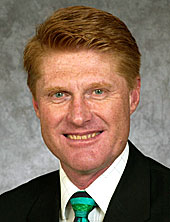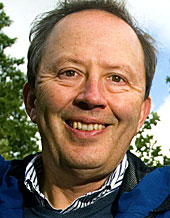AMES, Iowa -- Ted Crosbie thinks corn has more than a decade as the primary feedstock for biofuel production in the United States. G. David Tilman would like to see a long-term switch to a mix of non-food crops feeding the biofuels industry.
Both will make their points and counterpoints during the annual Biobased Industry Outlook Conference Sept. 8-9 at Iowa State University. This year's conference -- "Growing the Bioeconomy: From Foundational Science to Sustainable Practice" -- will feature a morning-long session of prominent speakers debating three major issues facing a growing bioeconomy that's based on producing fuels, chemicals and other products from plants rather than petroleum.
The point/counterpoint session will be 8 a.m. to 12:30 p.m. Monday, Sept. 8, in Iowa State's C.Y. Stephens Auditorium. Registration information is here.
One segment will feature Crosbie and Tilman addressing the food versus fuel debate. Should some corn be diverted from food production to fuel production? Can corn ethanol give us enough new energy to matter? Does it reduce or increase greenhouse gas levels? Are there economical alternatives to producing fuel from corn? Can farmers produce enough grain or biomass feedstocks to meet all the demand? What makes the most sense?
Crosbie, vice president of global plant breeding for Monsanto Co. and a member of the board advising Iowa State's Plant Sciences Institute, said corn-based biofuel has obvious benefits compared to current alternatives for United States agriculture. Farmers know how to efficiently grow, harvest and transport the crop and there are industrial-scale technologies to convert the grain into ethanol.
Tilman, Regents Professor and McKnight Presidential Chair in Ecology at the University of Minnesota in the Twin Cities, countered that thorough analyses show that these conversion technologies use so much energy and release so much greenhouse gas that society is better off burning gasoline rather than corn ethanol.
Crosbie also said plant science and production advancements will double today's corn yields by 2030. That will mean there's more corn for food and fuel production. And it could mean the best fields will produce enough grain that marginal farmland could be set aside for prairie grasses and other perennial biomass crops.
Tilman said the global demand for grains is likely to double or even triple in the coming 50 years, and that any corn diverted to an inefficient biofuel forces other nations to clear native ecosystems to grow more grain. Land clearing releases so much greenhouse gas that across the globe corn ethanol may release twice as much greenhouse gas as gasoline.
Tilman said that biofuels should be made from feedstocks that can be grown on infertile and degraded lands no longer suitable for food crops if biofuels are to provide much new energy and significant greenhouse gas advantages. The large-scale conversion of food into liquid transportation fuels will make the price of food equal to its energy value of about $120 a barrel for oil. He said that will raise the price of food and harm the poorest two billion people on earth.
Crosbie said the food vs. fuel debate often loses sight of the fact that many perennial crops are also used to produce food and that corn is a very flexible, multi-use crop. Growers can decide on a moment's notice whether to use corn grain for livestock feed, in food processing or for ethanol production. Likewise, they can decide in real time whether to use corn stalks and leaves for livestock feed, in thermal or biochemical conversion systems to produce various forms of energy or for cellulosic ethanol production. No other crop has that potential and flexibility.
Crosbie also doesn't believe corn will be the only feedstock for biofuel production.
"It's an 'and' equation," he said. "It's not corn grain or biomass. We think we should research all of the possibilities. All we are saying is that corn is clearly way ahead of alternative crops now and for the foreseeable future in terms of food and feed and fuel production."
Tilman said he tries to look 20 to 30 years ahead as he thinks about the developing bioeconomy. The world's population will climb toward 9 billion over that period and he said researchers need to look beyond corn fields to find sustainable ways to meet all the food and fuel needs of that population.
In his long-term view, "We'll be using corn for food again."
Two other speakers will address the technologies that should be used to convert biomass into fuels and other products. Charles Wyman, the Ford Motor Company Chair and professor of chemical and environmental engineering at the University of California, Riverside, will argue for the biological conversion of biomass into fuels and other products. John Regalbuto, a professor of chemical engineering at the University of Illinois at Chicago, will argue for the thermochemical conversion of biomass.
Two others will address how a bioeconomy could affect global climate change. Stephen Long, a professor of crop sciences at the University of Illinois at Urbana-Champaign and deputy director of the Energy Biosciences Institute, will argue that biofuels can help mitigate global climate change. Timothy Searchinger, a visiting research scholar at Princeton University's Woodrow Wilson School of Public and International Affairs, will argue that biofuel production causes land use changes that increase greenhouse gas emissions.
The remainder of the conference will feature technology tours and breakout sessions covering scientific, economic, social and policy issues related to a bioeconomy. A complete schedule is here.

